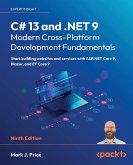Build robust applications in C# easily using effective and popular design patterns and best practices Key Features:Recognize solutions to common problems in software design with C# Explore real-world applications of design patterns that can be used in your everyday work Get to grips with 14 patterns and their design implementations Book Description: As a software developer, you need to learn new languages and simultaneously get familiarized with the programming paradigms and methods of leveraging patterns, as both a communications tool and an advantage when designing well-written, easy-to-maintain code. Design patterns, being a collection of best practices, provide the necessary wisdom to help you overcome common sets of challenges in object-oriented design and programming. This practical guide to design patterns helps C# developers put their programming knowledge to work. The book takes a hands-on approach to introducing patterns and anti-patterns, elaborating on 14 patterns along with their real-world implementations. Throughout the book, you'll understand the implementation of each pattern, as well as find out how to successfully implement those patterns in C# code within the context of a real-world project. By the end of this design patterns book, you'll be able to recognize situations that tempt you to reinvent the wheel, and quickly avoid the time and cost associated with solving common and well-understood problems with battle-tested design patterns. What You Will Learn:Get to grips with patterns, and discover how to conceive and document them Explore common patterns that may come up in your everyday work Recognize common anti-patterns early in the process Use creational patterns to create flexible and robust object structures Enhance class designs with structural patterns Simplify object interaction and behavior with behavioral patterns Who this book is for: This book is for beginner and mid-level software developers who are looking to take their object-oriented programs or software designing skills to the next level by learning to leverage common patterns. A firm grasp of programming fundamentals and classical object-oriented programming (OOP) using languages like C#, C++, Objective-C, or Java is expected.
Bitte wählen Sie Ihr Anliegen aus.
Rechnungen
Retourenschein anfordern
Bestellstatus
Storno









